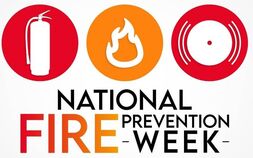Posted By IAMU,
Wednesday, October 4, 2023
|
 Article from https://www.nfpa.org/Events/Events/Fire-Prevention-Week/About AND https://www.usfa.fema.gov/statisticsSince
1922, the NFPA has sponsored the public observance of Fire Prevention
Week. In 1925, President Calvin Coolidge proclaimed Fire Prevention Week
a national observance, making it the longest-running public health
observance in our country. During Fire Prevention Week, children,
adults, and teachers learn how to stay safe in case of a fire.
Firefighters provide lifesaving public education in an effort to
drastically decrease casualties caused by fires. Fire Prevention
Week is observed each year during the week of October 9th in
commemoration of the Great Chicago Fire, which began on October 8, 1871,
and caused devastating damage. This horrific conflagration killed more
than 250 people, left 100,000 homeless, destroyed more than 17,400
structures, and burned more than 2,000 acres of land. This year’s
Fire Prevention Week™ (FPW™) campaign, “Cooking safety starts with YOU.
Pay attention to fire prevention™,” works to educate everyone [home and
work] about simple but important actions they can take to keep
themselves and those around them safe when cooking. Other Information: - Cooking
fires are the leading cause of fires in both residential and
non-residential (work) categories (2021 National estimates).
- Portable
Heater Fires in Residential Buildings (2017-2019): While portable
heater fires in residential buildings were only 3% of all heating fires
in residential buildings, their consequences were substantial,
accounting for 41% of fatal heating fires in residential buildings. Many
of these fires were preventable, as human error was a contributing
factor to the fire.
- Men are more likely to die (Male 62.3% and Female 37.7%) and be injured (Male 59.6% and Female 40.4%) in fires.
- Smoking fires cause nearly 1 in 4 home fire deaths. Smoking materials start 1 in 20 home structure fires.
- Despite
a drop in the number of fires, the rate of fire-caused fatalities has
remained steady, partly due to modern building trends like open spaces,
the increased use of synthetic materials and lightweight wood
construction, all of which cause fires to spread more quickly.
- You
used to have 7 to 8 minutes to leave your home after you heard the
smoke alarm. Now, you have 1 or 2 minutes from the time the alarm
sounds.
You need to be prepared in advance of a fire.
Make sure you have properly maintained and fully functional smoke
detectors and evacuation/escape plans.
Tags:
Fire Prevention Week
Permalink
| Comments (0)
|


 Facebook
Facebook Twitter
Twitter Linkedin
Linkedin